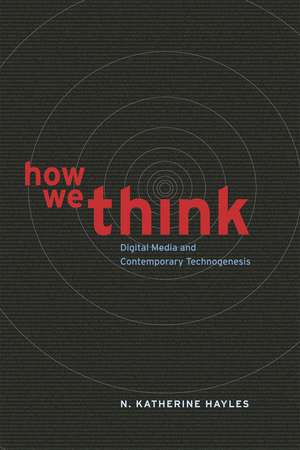How We Think: Digital Media and Contemporary Technogenesis
Autor N. Katherine Haylesen Limba Engleză Paperback – 5 iun 2012
Hayles examines the evolution of the field from the traditional humanities and how the digital humanities are changing academic scholarship, research, teaching, and publication. She goes on to depict the neurological consequences of working in digital media, where skimming and scanning, or “hyper reading,” and analysis through machine algorithms are forms of reading as valid as close reading once was. Hayles contends that we must recognize all three types of reading and understand the limitations and possibilities of each. In addition to illustrating what a comparative media perspective entails, Hayles explores the technogenesis spiral in its full complexity. She considers the effects of early databases such as telegraph code books and confronts our changing perceptions of time and space in the digital age, illustrating this through three innovative digital productions—Steve Tomasula’s electronic novel, TOC; Steven Hall’s The Raw Shark Texts; and Mark Z. Danielewski’s Only Revolutions.
Deepening our understanding of the extraordinary transformative powers digital technologies have placed in the hands of humanists, How We Think presents a cogent rationale for tackling the challenges facing the humanities today.
Preț: 157.79 lei
Preț vechi: 192.61 lei
-18% Nou
Puncte Express: 237
Preț estimativ în valută:
30.20€ • 31.41$ • 24.93£
30.20€ • 31.41$ • 24.93£
Carte indisponibilă temporar
Doresc să fiu notificat când acest titlu va fi disponibil:
Se trimite...
Preluare comenzi: 021 569.72.76
Specificații
ISBN-13: 9780226321424
ISBN-10: 0226321428
Pagini: 296
Ilustrații: 33 halftones
Dimensiuni: 152 x 229 x 20 mm
Greutate: 0.4 kg
Editura: University of Chicago Press
Colecția University of Chicago Press
ISBN-10: 0226321428
Pagini: 296
Ilustrații: 33 halftones
Dimensiuni: 152 x 229 x 20 mm
Greutate: 0.4 kg
Editura: University of Chicago Press
Colecția University of Chicago Press
Notă biografică
N. Katherine Hayles is professor of literature at Duke University. Her books include How We Became Posthuman: Virtual Bodies in Cybernetics, Literature, and Informatics and Writing Machines.
Cuprins
List of Figures
Acknowledgments
Acknowledgments
1. How We Think: Digital Media and Contemporary Technogenesis
First Interlude: Practices and Processes in Digital Media
2. The Digital Humanities: Engaging the Issues
3. How We Read: Close, Hyper, Machine
Second Interlude: The Complexities of Contemporary Technogenesis
4. Tech-TOC: Complex Temporalities and Contemporary Technogenesis
5. Technogenesis in Action: Telegraph Code Books and the Place of the Human
Third Interlude: Narrative and Database: Digital Media as Forms
6. Narrative and Database: Spatial History and the Limits of Symbiosis
7. Transcendent Data and Transmedia Narrative: Steven Hall’s The Raw Shark Texts
8. Mapping Time, Charting Data: The Spatial Aesthetic of Mark Z. Danielewski’s Only Revolutions
Notes
Works Cited
Index
Recenzii
“How We Think offers a comprehensive account of how humanities scholars and students apprehend their work differently in the context of the digital turn. The perfect fusion of N. Katherine Hayles’s characteristically lucid technical explanations and virtuosic literary analyses, this book navigates the divide between the traditional and digital humanities and shows us how they might in fact intellectually stimulate and support each other. A discipline supposedly in crisis has never seemed so vibrant.”—Rita Raley, University of California, Santa Barbara
“Compelling, brilliant, remarkable for its breadth and its insightful mapping of the digital humanities. A must read for all humanities scholars wanting to move beyond the hype and hysteria surrounding digital media.”—Wendy Hui Kyong Chun, Brown University
“If you are presently teaching or practicing digital, or a traditional academic in denial, or just curious about the impact of digital technology in the humanities, How We Think has arrived at the right time.”
“By making use of the humanist and scientist vocabularies, the book represents a new model of humanist writing, one that is avowedly concerned with the material aspects of epistemological practices.”
“How We Think disrupts the popular notion that there is a technological split between generations or between fields of study. . . . Hayles thoroughly supports her argument for technogenesis, providing concrete examples of the coevolution of humans and technics. She also explores the nuanced construction of temporality, spatiality, narrative, and database that occurs at the interface between human and technological beings. Whether or not we are prepared to welcome this intersection into our lives and work, it is already present and inextricable.”
